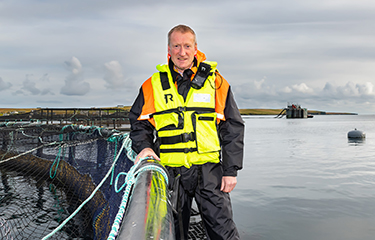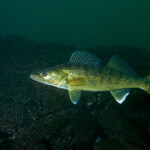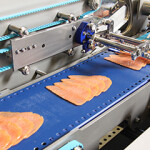SSPO CEO Tavish Scott hopes to lead Scottish salmon industry to stable future

Leading an industry he firmly believes in to an economically and environmentally stable future is a task that Tavish Scott, the new CEO of the Scottish Salmon Producers’ Organisation (SSPO), is relishing.
A former longtime member of the Scottish Parliament and leader of the Scottish Liberal Democrats, Scott left his position as head of external affairs at Scottish Rugby last year to tackle the salmon industry’s challenges head-on, including the need to reform and streamline the industry's regulatory system.
Not least of his tasks is an effort to counter an ongoing barrage of criticism from the anti-salmon farming lobby and other detractors. Nonetheless, salmon remains firmly as one of the top five favorite fish in the United Kingdom and is the country’s biggest food export, worth GBP 451 million (USD 618.7 million, EUR 523.8 million) in 2020.
Scott acknowledges the detractors’ concerns, and the fact that the salmon industry is not without its issues – which include sea lice, escapes, effluent, use of antimicrobials, and the percentage of fishmeal and fish oil used in feed. However, huge investments, advances in technology, and innovation in science is being applied in an effort to get on top of them, he told SeafoodSource.
Scott said he engages with anyone who will listen, demonstrating with facts and figures, that the industry has made considerable strides over the past few years towards responsible and sustainable production, but said some anti-salmon farming activists have their own agenda and are rarely willing to engage.
“It is important to have an ongoing and professional relationship with our wider stakeholder community, who have legitimate concerns and questions,” Scott said. “We do our best to ensure that everyone from school parties to government ministers can visit and learn about the whole production cycle. In this way, we are winning the argument about the realities of salmon farming, rather than the utter nonsense that is thrown our way by people with only one interest, and that is to attack us.”
In taking up his challenging new role, Scott told SeafoodSource that he felt as if he was “coming home.”
“During 20 years of politics representing Shetland, and before that as a local councilor, I saw the industry grow and develop from 30 separate small businesses, to the current position where we have three international companies owning the Shetland part of Scottish production,” he said.
Scott's background has made him both familiar and comfortable with the salmon farming industry, he said, and he's quick to point out the huge part that it plays in many remote rural areas.
“I know that if this sector did not exist, many rural and island parts of Scotland would not have local schools, or shops or a garage, because salmon farming is the economic driver of so many small communities,” he said.
In tackling the big issues surrounding salmon-farming, Scott’s approach is centered on a newly drafted sustainability charter, which contains a series of pledges and action points designed to test and stretch the industry to become more sustainable. Developed in consultation with SSPO members and the wider supply chain – including environmental organizations – the charter sets out a path to working in harmony with the environment of the Scottish coastline and recognizing the industry’s responsibilities.
“We looked at what needed to happen, how we needed to position ourselves, and at all the practical steps we want to take over coming years to constantly improve the fish we produce, and get our environmental responsibilities right,” Scott said. “Developing the sector's sustainability is a challenge, and we don’t have all the answers yet, but it is great to have the bedrock of the groundbreaking new charter at the heart of what we are doing now.”
The charter commits the sector to achieving key targets in fish health and welfare, community support, employment, and maintaining the highest standards for Scottish salmon as a food, Scott said.
On the environmental front, the industry is committed to becoming net zero in greenhouse gas emissions before 2045, with the goal of using renewable energy for 100 percent of its needs. Full traceability of all feed ingredients will become mandatory, along with guarantees that they come from sustainable sources, Scott said. Packaging is also targeted for improvement, with industry tasked with working towards 100 percent recyclable packaging.
“This was no hard sell to the Scottish industry, which produced 200,000 metric tons in 2020; it was something everyone wanted to do. And that’s what gets me about the criticism of our people and companies. They are very go-ahead in terms of thinking about the environment,” Scott said. “Many of them are internationally owned and all have an international perspective, and the idea that we are an insular industry couldn’t be further from the truth.”
Hired in September 2020, Scott was also thrown into the major challenge caused by COVID-19, which has seen industry turn more towards retail trade, as the global hospitality sector remains largely shuttered, and toward the European market, as international airfreight slots are both scarce and expensive.
COVID-19 issues have been compounded by the ongoing fallout from Brexit, which has resulted in a rise in transport costs, considerable amounts of red tape, and delays reaching market, with a knock-on effect on price and demand. Scott is currently working with government to improve the situation.
“We are confident that exports will revive as markets open up again and that 2021 will be a better year for the sector,” he said.
Photo courtesy of the Scottish Salmon Producers’ Organisation






Share